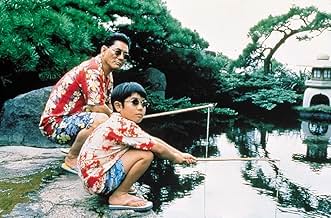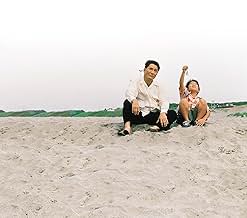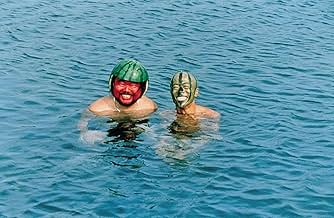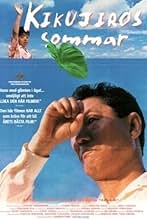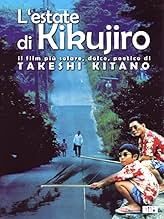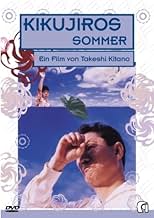IMDb RATING
7.7/10
23K
YOUR RATING
A young, naive boy sets out alone on the road to find his wayward mother. Soon he finds an unlikely protector in a crotchety man and the two have a series of unexpected adventures along the ... Read allA young, naive boy sets out alone on the road to find his wayward mother. Soon he finds an unlikely protector in a crotchety man and the two have a series of unexpected adventures along the way.A young, naive boy sets out alone on the road to find his wayward mother. Soon he finds an unlikely protector in a crotchety man and the two have a series of unexpected adventures along the way.
- Awards
- 4 wins & 4 nominations total
Takeshi Kitano
- Kikujiro
- (as Beat Takeshi)
The Great Gidayû
- Biker
- (as Gurêto Gidayû)
Beat Kiyoshi
- Man at Bus Stop
- (as Bîto Kiyoshi)
Yôji Tanaka
- Yakuza Henchman
- (as Yoji Tanaka)
- Director
- Writer
- All cast & crew
- Production, box office & more at IMDbPro
Featured reviews
Western audiences basically only know Beat Takeshi for his tough guy persona. Japanese audiences have seen many sides to him for a long time, and probably regard him as a comedian more than anything else. Maybe this is the reason why 'Kikujiro' isn't all that well known. Takeshi wrote and directed this movie as a follow up to his most celebrated work 'Hana-bi', but as it isn't a yakuza crime drama, it seems to have been largely overlooked. And that's a damn shame, because it's a very good movie, and anyone who enjoys Kitano's work will enjoy it. On paper the plot looks very Disney-like (grumpy old coot hits the road with an unhappy kid), but hey, this is Beat Takeshi, so what he does with it is always original and surprising. Much of the movie is playful, but then much of 'Sonatine' was too, only 'Kikujiro' doesn't mix that up with the orgy of violence you might expect from watching Kitano's better known movies. However it does have some dark moments that you would NEVER see in a Hollywood film dealing with similar "heart warming" subject matter, especially the "scary man" sequence featuring Akaji Maro, an actor you might recognise from Tarantino's 'Kill Bill'. I enjoyed 'Kikujiro' a lot, and the more Kitano movies I see, the more I think he is one of the most underrated directors working today.
Maybe Takeshi Kitano remembered his travel with his father (Kikujiro), maybe he just wanted to show his father just like he wanted to see him. Anyway this film, despite of very few words and quite simple dialogue lines, shows so many emotions that after seeing it, sometimes laughing, sometimes sad and full of empathy, i have spent many days thinking of it. How can grown-up simple man witch is not quite good in relationships with people, can spent so much time with little boy. How so violent person can show beautiful world to sad little boy. Takeshi is one of my favorite actor/director/writer. I discovered him just by being bored with all-the-same Hollywood movies. Now, thanks to him, I'm truly in "love" with Asian movies. For those who liked this movie, and wants to see some good others, see the Hana-Bi (little violent, but even more deep) and Dolls (i was crying - one reason was i was touched, second - beauty of the colors and form).....For me its just one word - Outstanding.
Kikujiro is a movie with beautiful calmness that's a great diversity from the fast cut movies today. Takeshi Kitano proofs once and for all, that he's a master filmmaker that will forever be remembered. And even though he dislikes the fame that goes along with his more successful movies (Zatoichi), it's a shame he doesn't get more recognition for his films.
Kikujiro no natsu tells the story of a kid who decides to visit his mother that he never met. Through odd circumstances kikujiro (Kitano), though absolutely unqualified, is forced to lead the kid. But as we see only moments later the boy would be better off alone, as kikujiro's fondness of gambling and (very amusing) way to treat people makes the journey a funny and quite touching odyssee.
What stands out in this movie is the simple comedy. It shows Kitano started off as a comedian, and his dialogue and acting made me almost spill my milk more than a few times. This is certainly one of his best. A great film for a quiet, rainy sunday afternoon.
Kikujiro no natsu tells the story of a kid who decides to visit his mother that he never met. Through odd circumstances kikujiro (Kitano), though absolutely unqualified, is forced to lead the kid. But as we see only moments later the boy would be better off alone, as kikujiro's fondness of gambling and (very amusing) way to treat people makes the journey a funny and quite touching odyssee.
What stands out in this movie is the simple comedy. It shows Kitano started off as a comedian, and his dialogue and acting made me almost spill my milk more than a few times. This is certainly one of his best. A great film for a quiet, rainy sunday afternoon.
If it wasn't for the perverted old man and the language, this would probably be a really good children's movie. Who knows, maybe it's intended to be...
Anyway, little Masao lives with his grandmother and has never met his parents: his father is dead and his mother ran away. He knows where his mother lives, however, and wants to go visit her over the Summer, so his kindly neighbor conscripts her profligate husband to take him. "Mister", as Masao calls him, doesn't make the ideal companion with his absurd behavior and his verbal abuse, but they go off to adventure anyways and learn to really connect with each other.
The power this film has lies mostly in its contemplative approach. It's very humorous and isn't really slow, but the camera does take the time to linger on locales, faces, and characters. For a few odd parts here and there, it's still really innocent and it seems to show that most people are kind-natured at heart, even when they project an aura of toughness and abusiveness. An interesting aside to analyze that theme would be the carnival scene, where people entrusted with family entertainment turn out to be violent cheaters, whereas even the heavy-metal biker folk are more than willing to go out of their way to help Masao.
The film itself is from Masao's perspective, as a childhood's slightly photographic memory comes into play, mixed a lot with colorful imagination. The humor is the best part, as it is at times really simple but holds itself up well. There's a lot to enjoy in this film.
--PolarisDiB
Anyway, little Masao lives with his grandmother and has never met his parents: his father is dead and his mother ran away. He knows where his mother lives, however, and wants to go visit her over the Summer, so his kindly neighbor conscripts her profligate husband to take him. "Mister", as Masao calls him, doesn't make the ideal companion with his absurd behavior and his verbal abuse, but they go off to adventure anyways and learn to really connect with each other.
The power this film has lies mostly in its contemplative approach. It's very humorous and isn't really slow, but the camera does take the time to linger on locales, faces, and characters. For a few odd parts here and there, it's still really innocent and it seems to show that most people are kind-natured at heart, even when they project an aura of toughness and abusiveness. An interesting aside to analyze that theme would be the carnival scene, where people entrusted with family entertainment turn out to be violent cheaters, whereas even the heavy-metal biker folk are more than willing to go out of their way to help Masao.
The film itself is from Masao's perspective, as a childhood's slightly photographic memory comes into play, mixed a lot with colorful imagination. The humor is the best part, as it is at times really simple but holds itself up well. There's a lot to enjoy in this film.
--PolarisDiB
It is summertime, and Masao is a lonely boy living with his grandmother in Tokyo. One day, he finds an address supposedly belonging to his long-lost mother, and decides to try and find her. His grandmother's friend insists that her husband, Kikujiro, accompany Masao, and the two set out together; despite not knowing each other well. On their long journey, Kikujiro and Masao engage in many adventures, meeting colourful characters along the way and forging a bond stronger than that between parent and child. Whether or not their friendship withstands the test of time- and if they find Masao's mother- remains to be seen in the dramatic powerhouse that is Takeshi Kitano's 'Kikujiro.'
Kitano's eighth feature film, 'Kikujiro' is a delightfully funny and poignant road movie sure to warm the cockles of any viewers' heart. A simple story about friendship and connection, the trip Masao and Kikujiro undertake contains subtle power and emotional depth, whilst also being frequently hilarious. The characters are all well-drawn and the escapades they engage in both wildly entertaining and affecting. The relationship that develops between Masao and Kikujiro is realistic and heart-warming, and the film's exploration of those considered 'outsiders' is one most intelligent and subdued. Much like Kitano's previous 'A Scene At The Sea,' the film's power is of the low-key and naturalistic variety; and 'Kikujiro' will surely linger in the mind long after the credits have rolled.
'Kikujiro' reunites Kitano with cinematographer Katsumi Yanagishima, for their sixth out of sixteen collaborations. Yanagishima's muted work is undeniably powerful and beguiling, lending the film and its' story additional beauty and depth. His is not pretentious or needlessly hectic cinematography, it is steady and sure work that produces sagacious, artful and distinct results. That Kitano has utilised Yanagishima's immeasurable talents for every one of his movies bar 'Violent Cop' and 'Hana-Bi' proves just how effectively the two men work together; and the visuals borne of their partnership for 'Kikujiro' are unforgettable.
The same can be said of another frequent collaborator of Kitano's, composer Joe Hisaishi: his score for 'Kikujiro' is catchy and evocative. The fifth film of Kitano's Hisaishi has worked on, his melodies are haunting and delicate. The theme, 'Summer,' is particularly beautiful, and like an earwig worms it's way into one's subconscious, establishing itself as a tune one will find it most difficult to forget. Hisaishi frequently plays the 'Kikujiro' soundtrack while touring, and the enduring popularity of the music shows just how moving and ineffaceable it is.
'Kikujiro' also boasts highly detailed costume design from Fumio Iwasaki that lends additional dimension to characters, as well as echoing past works from Kitano's cinematic canon (most notably through the short sleeved Hawaiian shirts featured so prominently in 'Sonatine'). Also of note is Ryôji Kasumi and Michio Miyauchi's work in the makeup department and Tatsuo Ozeki's rich set decoration; which adds further believability to the proceedings.
'Kikujiro' stars Kitano in the titular role and Yusuke Sekiguchi as Masao, making his big screen debut. Sekiguchi is a fine actor who remains understated throughout, crafting in Masao a character both believable and compelling. It could be argued that he has the least to do in the cast- certainly he has relatively little dialogue or any large displays of emotion- and that many other young boys could have played the role as effectively. However, that is to do a serious discredit to the subtlety of his acting. Though he only has one other film role to date, Sekiguchi has left an indelible imprint on cinema through his brilliant performance as Masao.
Kitano is terrific as Kikujiro, making him a slightly unhinged comedic force of nature, as well as a profoundly complex man. His relationship with Masao forces him to examine his own life, which he finds wanting; and Kitano's performance is powerfully understated and wildly entertaining. It is assumed that Kikujiro is a facsimile of Kitano's own father, and the fondness and exuberance with which he approaches the role betrays a great respect, admiration and love for the man. Kitano's Kikujiro may be one of his finest performances from his storied career; and is certainly his warmest and most heartfelt.
The supporting cast is populated with talented actors like Kayoko Kishimoto and Akaji Maro, both of whom steal their too few scenes as Kikujiro's wife and a seedy fellow Masao encounters in a park, respectively. All the secondary performers do admirable work, with Nezumi Imamura, Gurêto Gidayû and Rakkyo Ide impressing and entertaining the most as a travelling writer and two bikers Masao and Kikujiro befriend along the way. From the smallest role to the titular one; everyone in the film is perfectly cast.
'Kikujiro' is a powerful, funny and genuinely moving film from Takeshi Kitano that impresses on every level. Strongly acted, well-written and featuring stunning cinematography from Katsumi Yanagishima; the movie is entertaining and memorable both. With an atmospheric Joe Hisaishi score and detailed costume and set design; there is little to fault with the film. In short, 'Kikujiro' is a bittersweet symphony of unaffected profundity and voluminous emotional depth that hits all the right notes.
Kitano's eighth feature film, 'Kikujiro' is a delightfully funny and poignant road movie sure to warm the cockles of any viewers' heart. A simple story about friendship and connection, the trip Masao and Kikujiro undertake contains subtle power and emotional depth, whilst also being frequently hilarious. The characters are all well-drawn and the escapades they engage in both wildly entertaining and affecting. The relationship that develops between Masao and Kikujiro is realistic and heart-warming, and the film's exploration of those considered 'outsiders' is one most intelligent and subdued. Much like Kitano's previous 'A Scene At The Sea,' the film's power is of the low-key and naturalistic variety; and 'Kikujiro' will surely linger in the mind long after the credits have rolled.
'Kikujiro' reunites Kitano with cinematographer Katsumi Yanagishima, for their sixth out of sixteen collaborations. Yanagishima's muted work is undeniably powerful and beguiling, lending the film and its' story additional beauty and depth. His is not pretentious or needlessly hectic cinematography, it is steady and sure work that produces sagacious, artful and distinct results. That Kitano has utilised Yanagishima's immeasurable talents for every one of his movies bar 'Violent Cop' and 'Hana-Bi' proves just how effectively the two men work together; and the visuals borne of their partnership for 'Kikujiro' are unforgettable.
The same can be said of another frequent collaborator of Kitano's, composer Joe Hisaishi: his score for 'Kikujiro' is catchy and evocative. The fifth film of Kitano's Hisaishi has worked on, his melodies are haunting and delicate. The theme, 'Summer,' is particularly beautiful, and like an earwig worms it's way into one's subconscious, establishing itself as a tune one will find it most difficult to forget. Hisaishi frequently plays the 'Kikujiro' soundtrack while touring, and the enduring popularity of the music shows just how moving and ineffaceable it is.
'Kikujiro' also boasts highly detailed costume design from Fumio Iwasaki that lends additional dimension to characters, as well as echoing past works from Kitano's cinematic canon (most notably through the short sleeved Hawaiian shirts featured so prominently in 'Sonatine'). Also of note is Ryôji Kasumi and Michio Miyauchi's work in the makeup department and Tatsuo Ozeki's rich set decoration; which adds further believability to the proceedings.
'Kikujiro' stars Kitano in the titular role and Yusuke Sekiguchi as Masao, making his big screen debut. Sekiguchi is a fine actor who remains understated throughout, crafting in Masao a character both believable and compelling. It could be argued that he has the least to do in the cast- certainly he has relatively little dialogue or any large displays of emotion- and that many other young boys could have played the role as effectively. However, that is to do a serious discredit to the subtlety of his acting. Though he only has one other film role to date, Sekiguchi has left an indelible imprint on cinema through his brilliant performance as Masao.
Kitano is terrific as Kikujiro, making him a slightly unhinged comedic force of nature, as well as a profoundly complex man. His relationship with Masao forces him to examine his own life, which he finds wanting; and Kitano's performance is powerfully understated and wildly entertaining. It is assumed that Kikujiro is a facsimile of Kitano's own father, and the fondness and exuberance with which he approaches the role betrays a great respect, admiration and love for the man. Kitano's Kikujiro may be one of his finest performances from his storied career; and is certainly his warmest and most heartfelt.
The supporting cast is populated with talented actors like Kayoko Kishimoto and Akaji Maro, both of whom steal their too few scenes as Kikujiro's wife and a seedy fellow Masao encounters in a park, respectively. All the secondary performers do admirable work, with Nezumi Imamura, Gurêto Gidayû and Rakkyo Ide impressing and entertaining the most as a travelling writer and two bikers Masao and Kikujiro befriend along the way. From the smallest role to the titular one; everyone in the film is perfectly cast.
'Kikujiro' is a powerful, funny and genuinely moving film from Takeshi Kitano that impresses on every level. Strongly acted, well-written and featuring stunning cinematography from Katsumi Yanagishima; the movie is entertaining and memorable both. With an atmospheric Joe Hisaishi score and detailed costume and set design; there is little to fault with the film. In short, 'Kikujiro' is a bittersweet symphony of unaffected profundity and voluminous emotional depth that hits all the right notes.
Did you know
- TriviaTakeshi Kitano made this gentler film as an antidote to his usual violent gangster movies.
- Crazy creditsThere's one more scene after the credits.
- ConnectionsFeatured in Jam session - Kikujiro no natsu koshiki kaizokuban (1999)
- SoundtracksSummer
Written by Joe Hisaishi
- How long is Kikujiro?Powered by Alexa
Details
- Release date
- Country of origin
- Official sites
- Language
- Also known as
- Kikujiro
- Filming locations
- Sensoji Temple, Asakusa, Taito, Tokyo, Japan(Masao and his friend walk across the temple grounds)
- Production companies
- See more company credits at IMDbPro
Box office
- Gross US & Canada
- $200,920
- Opening weekend US & Canada
- $28,079
- May 28, 2000
- Gross worldwide
- $281,527
- Runtime2 hours 2 minutes
- Color
- Sound mix
- Aspect ratio
- 1.85 : 1
Contribute to this page
Suggest an edit or add missing content


